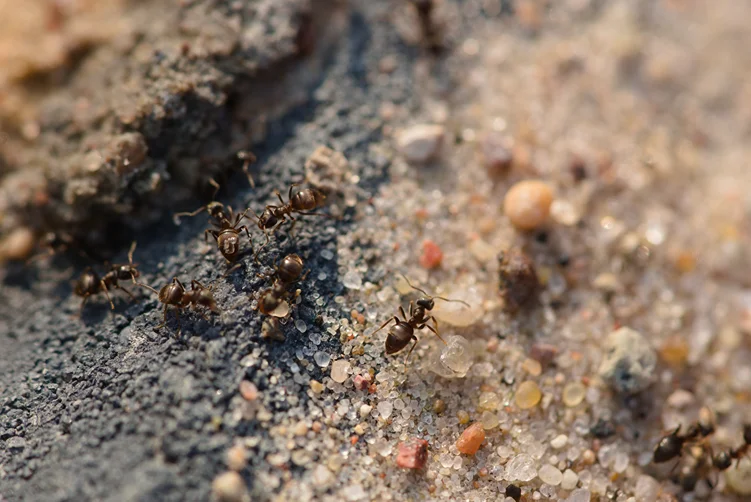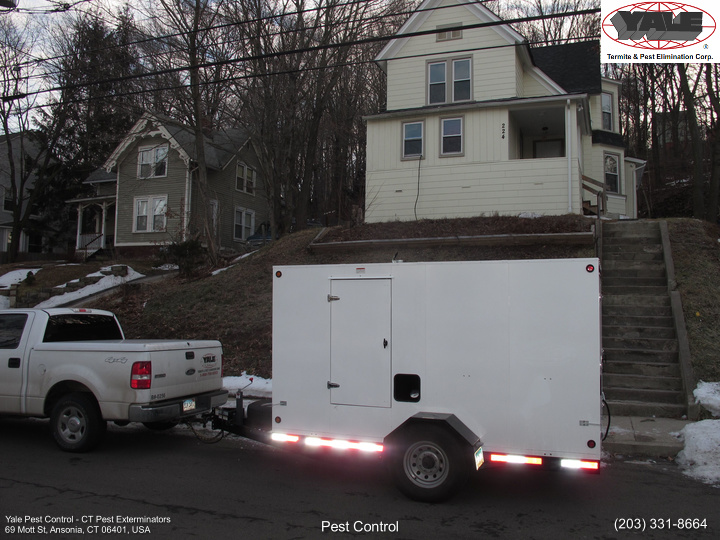
As peak summer approaches, pests like wasps, spiders, and ants, to mention a few, have most likely begun to appear in homes and yards across the region by now. But not to mention, ants will have probably already begun invading your home. Pavement ants will be the most common species of ants to make their way to your home.
But are these dark brown pests harmful to you and your family members? The simplest answer is no. They can be irritating when crawling on human skin, but these common ant species pose no real threat to people. Homeowners have nothing to fear, as these are also susceptible to a variety of treatment options like gel baits, bait traps, and chemical treatments.
Pavement ants generally don’t bite, but they can sting if necessary. These ants are typically calm and only use their stingers when absolutely necessary and humans can not get sick or ill from this ant sting.
The stinger is tiny and can't penetrate human skin in most circumstances. The skin of little children or sensitive areas like the underside of the forearm might get inflamed, resulting in a rash. In addition to contaminating food and harming the environment, the pavement ant can create other problems.
Pavement ants travel over surfaces, food preparation areas, countertops, and other areas as they migrate indoors. Bacteria, viruses, and other pathogens can readily be transferred throughout the procedure.
These ants are most commonly found outside, nesting behind stones in walkways or patios, or under curbing, they can sometimes be found inside, nesting in walls or under the floorboards of your home. The ants you see on your kitchen floor are the colony's workers, who are out searching for food sources.
Pavement ants, like any other pest, are drawn to homes that provide a safe, warm environment near food and water. They like to build their nests in cemented pavement cracks, under and under concrete foundations, and along sidewalks.
When it comes to types of foods, they're not picky. Pavement ants eat sweets, fruits, greasy foods and oil, pet food, and dead insects among other things. Pavement ants are attracted to properties with compost piles, gardens, and garbage cans with no covers.
Once pavement ants have established themselves on your property, it will only be a matter of time until they seek food inside your home. Through gaps in the foundation and external walls of your home, pavement ants can infest your home in vast numbers.
They will most likely choose to stay until they are forced out. Pavement ants nest behind walls in insulation, beneath floors, in crawl spaces, and/or in ground-level masonry walls within homes and other buildings.
The best method to tell if your home has been plagued by pavement ants is to notice worker pavement ants around your home. Pavement ants usually build their nests under floors or inside wall gaps, then leave to feed and contaminate the house.
Large colonies of up to 3,000 or 4,000 insects are attacked by these pests, as they are one of their ideal food sources. Spotting dead insects or insects with missing wings could be an indicator of pavements ants in the vicinity. If you find elevated mounds in the dirt near your home, it's a good sign you have pavement ants.
Pavement ants are a tough nuisance to eradicate without the assistance of a qualified expert since they infiltrate homes in enormous numbers, have several nesting places, and nest in difficult-to-reach spots.
An exterior barrier against ants should be installed, and it’s created by applying a non-repellent substance around the perimeter of your property; internal home treatments can also be applied if needed. These treatments should be done twice a year, in the spring and fall, to guarantee year-round pest control.
Meat, nuts, dead insects, and oily meals are all favorites of pavement ants. They have been observed nesting near human settlements in order to have easy access to the items they consume. Ant baits, bait traps, and liquid bait stations, can all be placed near food sources to draw them away and kill off their colony.
Pavement ants seek food, so the easiest approach to avoid an infestation is to keep all of your food closed and stored. Food sources should never be left out in the open, and spills should be cleaned up as soon as possible. To keep ants out of your house, make sure to seal cracks, especially those in your windows and foundation. Also, be sure to have a frequent pest inspection done to proactively prevent infestations.

It might be alarming to discover a swarm of ants in or near your house. For most homeowners, attempting to eliminate them is a daunting process. Thankfully, you’re not on your own. Yale Pest Control is your best friend for pest solutions, and companion in dealing with the threat of pests. We’re a family-owned group of pest management professionals that specialize in tracking pest activity and solving pest infestation problems.
Our pest control experts can quickly identify the cause of your ant problems and eliminate the threat from your space. The Yale Pest Control company ensures that the entire pavement ant colonies are eradicated from your home, keeping your kitchen and food supply safe from ant infestation.
Call us now at 800-750-9253.